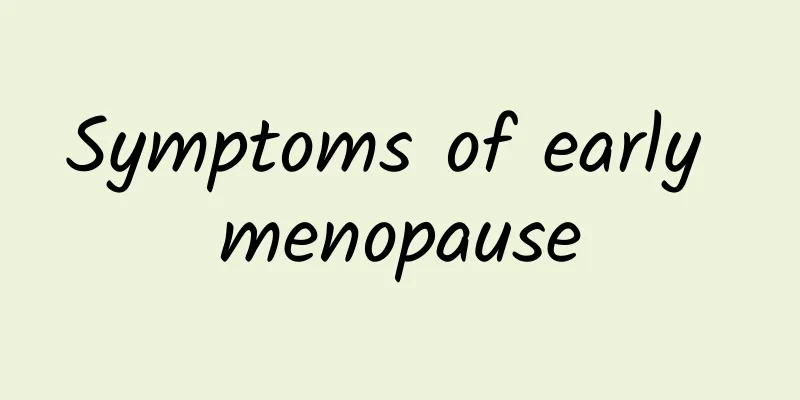Symptoms of early menopause

|
There are several manifestations in the early stage of menopause. First, menstrual disorders are common symptoms in the early stage of menopause. Due to rare ovulation or no ovulation, the menstrual cycle is irregular, the duration of menstruation is long, and the menstrual flow is increased or decreased. Second, the vasomotor state is mainly manifested as repeated short-term redness of the face, neck and chest skin accompanied by hot flashes, followed by sweating, which is easy to trigger at night or in emergency situations. Third, the symptoms of autonomic nervous system disorders are palpitations, dizziness, headaches, insomnia, tinnitus, etc. Fourth, the symptoms of mental nerves. Some women may show inattention, mood swings, irritability, anxiety, depression, etc. How to regulate menopause After menopause, due to the decline of hormone levels in women, a series of clinical symptoms will appear at this time. Therefore, in this case, calcium supplements should be taken first to prevent osteoporosis. While taking calcium tablets, you must get more sun and exercise, because only in this way can calcium absorption be promoted. In addition, at this time, you must pay attention to prevent some cardiovascular diseases and go to the hospital for regular physical examinations. Because after menopause, cardiovascular diseases are prone to occur frequently. If there is dryness of the vulva and a decrease in secretions, estrogen ointment can be applied locally to the vulva. What happens to postmenopausal women? The reason why women can have normal menstruation is that the function and structure of each link of the hypothalamus-pituitary-ovary-uterus are normal. Any abnormality in the structure or function of any link will lead to amenorrhea. Pregnant women no longer have menstruation after giving birth and experience menopause. This situation is generally more common in postpartum hemorrhage, which leads to ischemic necrosis of the pituitary gland, inability to secrete follicle-stimulating hormone and ovarian progesterone normally, and affects the hypothalamic pituitary gonadal secretion axis. In clinical practice, it is called Sheehan syndrome. In addition to amenorrhea, there will also be loss of libido, hair loss, and no lactation. Genital atrophy and hypothyroidism may also occur in the long term. |
<<: What to eat after ovarian cyst surgery
>>: How to regulate women's scanty menstruation?
Recommend
How to treat intrauterine adhesions after cesarean section
Intrauterine adhesions after cesarean section can...
Home Care for Pelvic Inflammatory Disease
Home Care for Pelvic Inflammatory Disease Pelvic ...
Here are some things to note about vulvar leukoplakia
The disease of vulvar leukoplakia should not be u...
We should pay attention to the nursing work of patients with cervical erosion
Cervical erosion is a very serious female disease...
Will untreated bacterial vaginosis lead to infertility?
Whether the pregnant woman is healthy directly af...
Where is the best hospital to check endometrial thickness?
Endometrial thickness is a common disease. Many w...
What are the symptoms of pelvic inflammatory disease?
Patients with pelvic inflammatory disease all kno...
Symptoms of adnexitis and cervicitis
Symptoms of adnexitis and cervicitis include lowe...
What should women with cervical erosion pay attention to in their diet? Patients with cervical erosion should take three steps to take care of themselves
Cervical erosion is a common cervical disease in ...
Brief Analysis of Traditional Chinese Medicine in Treating Endometrial Tuberculosis
The TCM treatment of endometrial tuberculosis is ...
Do uterine fibroids affect sexual desire?
Uterine fibroids themselves rarely interfere with...
How much does it cost to treat congenital absence of vagina?
Congenital absence of vagina is caused by the sta...
What are the hazards of endometrial tuberculosis to the human body?
Gynecologists tell us that endometrial tuberculos...
Those with scanty menstruation should beware of amenorrhea
Ms. Xu, 25 years old, often has amenorrhea, or sc...
Cervical hypertrophy exercise
The treatment of cervical hypertrophy can be impr...









